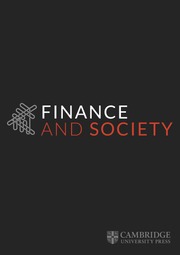Crossref Citations
This article has been cited by the following publications. This list is generated based on data provided by
Crossref.
Boy, Nina
2017.
Finance-security: Where to go?.
Finance and Society,
Vol. 3,
Issue. 2,
p.
208.
Westermeier, Carola
2019.
Political security and finance – A post-crisis and post-disciplinary perspective.
Zeitschrift für Politikwissenschaft,
Vol. 29,
Issue. 1,
p.
105.
Campbell-Verduyn, Malcolm
Goguen, Marcel
and
Porter, Tony
2019.
Finding fault lines in long chains of financial information.
Review of International Political Economy,
Vol. 26,
Issue. 5,
p.
911.
Langenohl, Andreas
2020.
Articulating Sovereignty within the Infrastructural Imagination: The Case of the Securitisation of Finance as ‘Critical Infrastructure’.
Politikon,
Vol. 47,
Issue. 1,
p.
4.
Bezuglaya, Natalia S.
and
Shamray, Inna N.
2020.
National Security and Coronavirus Disease (COVID-19) Pandemic: Challenges to the Economic System of the State and Prospects for Ensuring its Security.
REGIONOLOGY,
Vol. 28,
Issue. 3,
p.
449.
Westermeier, Carola
2020.
The value of transactions in the new data economy - Lana Swartz, New Money: How Payment Became Social Media, New Haven CT, Yale University Press, 2020, 272 pp., $28 (pub), ISBN 978-0-30023-322-3.
Finance and Society,
Vol. 6,
Issue. 2,
p.
157.
Donnelly, Faye
and
Vlcek, William
2021.
A tale of two currencies: talking about money and (De)Securitising moves in the 2014 Scottish independence referendum.
Critical Studies on Security,
Vol. 9,
Issue. 2,
p.
98.
Langenohl, Andreas
2022.
Securing the separation between state and finance: entanglements between securitization and societal differentiation.
Review of International Political Economy,
Vol. 29,
Issue. 5,
p.
1746.
Amicelle, Anthony
and
Chaudieu, Killian
2022.
The Most Denounced, the Least Punished: Ruling Elites, Illegalisms, and Anti-Money Laundering.
International Political Sociology,
Vol. 16,
Issue. 3,
Tellmann, Ute
2022.
The politics of assetization: from devices of calculation to devices of obligation.
Distinktion: Journal of Social Theory,
Vol. 23,
Issue. 1,
p.
33.
Dwyer, Andrew C.
Langenohl, Andreas
and
Lottholz, Philipp
2023.
Topologies of security: inquiring in/security across postcolonial and postsocialist scenes.
Critical Studies on Security,
Vol. 11,
Issue. 1,
p.
1.
Lagerwaard, Pieter
2023.
Financial surveillance and the role of the Financial Intelligence Unit (FIU) in the Netherlands.
Journal of Money Laundering Control,
Vol. 26,
Issue. 7,
p.
63.
Herlin-Karnell, Ester
2024.
Privatisation and Climate Change: a Question of Duties?.
Jus Cogens,
Vol. 6,
Issue. 1,
p.
89.
Langenohl, Andreas
and
Burghardt, Kevin
2024.
Non-Traditional Finance and the Infrastructural Imagination of Geoeconomic Hegemony: The Case of Russia’s War in Ukraine.
Journal of Global Security Studies,
Vol. 9,
Issue. 3,
Herlin-Karnell, Ester
2025.
Privatisation and Climate Change: a Question of Duties?.
SSRN Electronic Journal,


